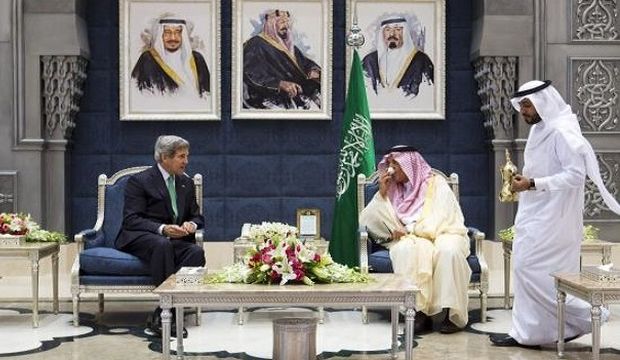Sir Christopher Meyer, the former British ambassador to the United States and Germany, recently wrote an opinion piece in the London-based Daily Telegraph newspaper with the title, ‘Chaos in the Middle East means it’s time for an alliance with Iran.’ The main gist of the article is that since there is no longer any chance of defeating the Assad regime in Syria in light of the support it receives from Moscow and Tehran, in addition to the “sudden” emergence of the Islamic State of Iraq and Syria (ISIS) and its ability to attract fighters from Western countries, then “whether we like it or not, we are in de facto alliance against Isil [ISIS] with Assad of Syria and with Iran, the implacable foe of our longstanding ally, Sunni Saudi Arabia.”
Meyer then recommends—astonishingly—that the West halt all military action against ISIS and “let the region sort out its own problems,” before going on to suggest that “if Isil [ISIS] is able to expand further in the Middle East, won’t this unavoidably lead to the conclusion that our strategic ally in the region for the 21st century must be Iran?”
Three main points are overlooked by this unrealistic assessment on dismantling the West’s alliance with Saudi Arabia and redirecting it towards Iran, whose political ideology seems to have suddenly become acceptable to Western countries.
First, the West has already experienced a six-decade alliance with Saudi Arabia and the other Gulf states, an alliance which any sensible observer will tell you has been entirely rational and has not resulted in any regional or global crises.
Second, Sunni terrorism, as the West refers to it, is the work of extremist groups which the Gulf states have fought and continue to fight relentlessly. The Gulf considers this its main fight right now, and the West can certainly attest to this. Shi’ite terrorism, meanwhile, represents a kind of reverse situation, whereby it is being sponsored directly by the Iranian regime itself—as we see with Hezbollah in Lebanon, the Islamic Revolutionary Guard Corps, the Popular Mobilization in Iraq, and a host of other Shi’ite extremist groups throughout the region.
The third point—and the most important, in my opinion—is that the West’s alliance with the Gulf states is not a handout which the West bestows on the Gulf out of the goodness of its heart, but more a partnership based solely on deep-rooted strategic interests that have proven their importance to both sides and from which both, and not just one side, have benefited.
Perhaps the “let the region sort out its own problems” strategy, which we can say is growing in popularity day by day in many Western circles, supposes that fighting terrorism in the Middle East represents an act of charity which the United States and its allies generously gift to the countries of the region? Doubtless, this view is a purely pragmatist one which does not accord with what Western intelligence agencies themselves would recommend—considering they are aware that “Counterterrorism 101” will always dictate that fighting the phenomenon in its locus of operation is a thousand times more preferable, and indeed easier, than fighting it after it reaches your own shores. An example here is the terrorist groups that emerged in Syria, which grew and flourished after Western countries ignored the advice of sensible allies—who recommended these groups be nipped in the bud before they spread and became more powerful—and decided not to intervene in the country. This represents a repeat of the Horn of Africa piracy scenario when, despite numerous warnings, Western countries ignored this phenomenon for years and took action only when the pirates began threatening global shipping routes and international trade.
The West’s alliance with Saudi Arabia is one which sees the convergence of numerous interests in a central and indeed natural way, and its continuation benefits the region and the world as a whole. Moreover, bolstering this alliance and even reviewing it will help its continued success. Meanwhile, talk of disbanding it entirely and redirecting Western efforts toward the other side in the Gulf will damage all concerned. For just as Saudi Arabia and the other Gulf states will lose the benefits of their strategic alliance with the West, so will the West lose many of its own interests in the region by gambling on a new alliance with a country that the West itself has classified an “axis of evil” and a rogue state—that is, before the nuclear deal transformed Iran into a friend and seeming ally.
